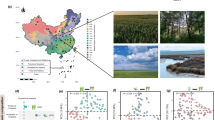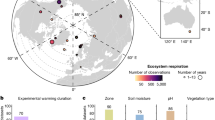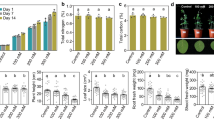Abstract
VERY few studies of the effect of the rhizosphere on soil algae have been made in the past1, and in a recent review Starkey2 states that it is possible that algal populations may even be decreased in the root zone. This communication presents evidence for a well-marked rhizosphere effect on soil algae by the roots of cultivated tea plants nominally referable to the Assam variety of Camellia sinensis (L) O. Kuntze.
This is a preview of subscription content, access via your institution
Access options
Subscribe to this journal
Receive 51 print issues and online access
$199.00 per year
only $3.90 per issue
Buy this article
- Purchase on Springer Link
- Instant access to full article PDF
Prices may be subject to local taxes which are calculated during checkout
Similar content being viewed by others
References
Katznelson, H., Soil. Sci., 62, 343 (1946).
Starkey, R. L., Bact. Rev., 22, 154 (1958).
Agnihothrudu, V., Proc. India Acad. Sci., 378, 1 (1953).
Bristol, B. M., Ann. Bot., 34, 35 (1920).
Author information
Authors and Affiliations
Rights and permissions
About this article
Cite this article
HADFIELD, W. Rhizosphere Effect on Soil Algae. Nature 185, 179–180 (1960). https://doi.org/10.1038/185179b0
Issue Date:
DOI: https://doi.org/10.1038/185179b0
This article is cited by
-
Rhizosphere: its structure, bacterial diversity and significance
Reviews in Environmental Science and Bio/Technology (2014)
-
The systematics and ecology of soil algae
The Botanical Review (1981)
-
A Rhizosphere Effect of the Pea Root on Soil Algae
Nature (1963)
Comments
By submitting a comment you agree to abide by our Terms and Community Guidelines. If you find something abusive or that does not comply with our terms or guidelines please flag it as inappropriate.



